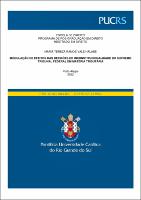| Share record |


|
Please use this identifier to cite or link to this item:
https://tede2.pucrs.br/tede2/handle/tede/10627| Document type: | Dissertação |
| Title: | Modulação de efeitos das decisões de inconstitucionalidade do Supremo Tribunal Federal em matéria tributária |
| Author: | Halabe, Maria Tereza Ramos Vale  |
| Advisor: | Silveira, Paulo Antônio Caliendo Velloso |
| Abstract (native): | A presente pesquisa tem por objeto de estudo o instituto jurídico da modulação de efeitos diante das decisões de inconstitucionalidade proferidas pelo Supremo Tribunal Federal (STF) em matéria tributária, tanto em sede de controle de constitucionalidade concreto quanto abstrato, analisando-se, de forma qualitativa, a jurisprudência da Corte dos últimos cinco anos, em especial, as decisões em que houve discussão sobre a modulação de efeitos. Visto que, entre outros requisitos exigidos pelas Leis nº 9.868/1999 e nº 9.882/1999, a modulação de efeitos se aplica com base nos conceitos indeterminados de “segurança jurídica” e de “excepcional interesse social”, questiona-se se as decisões do STF mantêm coerência interpretativa e se tal coerência está em consonância com a Constituição. Frisa-se que conceitos vagos podem dar ampla liberdade ao intérprete, a menos que sejam obedecidos alguns parâmetros. Com isto, espera-se trazer contribuições para a discussão sobre a aplicabilidade do instituto da modulação de efeitos em matéria tributária, investigando a seara argumentativa da Corte para fundamentar a modulação. Esta discussão é de grande relevância, haja vista o impacto das decisões do STF sobre os demais órgãos do Poder Judiciário e sobre a sociedade em geral, com destaque no presente trabalho para a esfera privada do contribuinte, visto que o campo de pesquisa dessa dissertação se dedica às decisões em matéria tributária. O método de abordagem adotado foi o hipotético-dedutivo, no qual buscou-se, com base na jurisprudência do STF, evidências que infirmassem a hipótese levantada, isto é, a de que existe um parâmetro decisório em relação ao alcance e sentido dos requisitos materiais para a aplicação da modulação de efeitos e esse parâmetro é constitucional. Como resultado, observou-se a necessidade de a Corte estabelecer, para os requisitos de excepcional interesse social e segurança jurídica, contornos mais alinhados com os direitos fundamentais, pois essa falta de delimitação, no primeiro caso, implicou numa fusão com o interesse do Estado-administrador e, no segundo caso, numa fusão com a ideia de segurança fiscal. À medida em que se permite a aplicação da vertente subjetiva da segurança jurídica a favor do Estado, ao lado do excepcional interesse público, a modulação se torna instituto em defesa de questões orçamentárias. |
| Abstract (english): | On the present research the study was centered in the legal institute of effects modulation in face of unconstitutionality decisions handed down by the Federal Supreme Court (STF) in tax matters, both in concrete and abstract control of constitutionality, analyzing, in a qualitative way, the jurisprudence of the Court of the last five years, in particular the decisions in which there was a discussion about the modulation of effects. Since, among other requirements imposed by Laws nº 9.868/1999 and nº 9.882/1999, the modulation of effects is applied based on the undetermined concepts of “legal certainty” and “exceptional social interest”, it is questioned whether the decisions of the STF maintain interpretative coherence and whether such coherence is in accordance with the Constitution. It must be emphasized that vague concepts can give ample freedom to the interpreter unless some parameters are obeyed. Therefore, it is expected to bring contributions to the discussion about the modulation of effects institution applicability in tax matters, investigating the Court's argumentative field to support the modulation. This discussion is of great relevance, in view that the impact of the STF decisions on the other Judiciary Branch agencies and on society in general, with particular emphasis in the present work, on the taxpayer's private sphere, since the field of research of the present dissertation is dedicated to decisions in tax matters. The method of approach adopted was the hypothetical-deductive, in which, based on the jurisprudence of the STF, evidence able to refute the raised hypotheses, that is, there is a decision parameter in relation to the scope and meaning of the material requirements for the application of effects modulation and this parameter is constitutional. As a result, there was a need for the Court to establish, for the requirements of exceptional social interest and legal certainty, more aligned edges with fundamental rights. Because this lack of delimitation, in the first case, implied a merger with the interest of the State-administrator and, in the second case, a merger with the idea of fiscal security. As it allows the application of the subjective aspect of legal certainty in favor of the State alongside the exceptional public interest, modulation becomes an institute in defense of budgetary matters. |
| Keywords: | Modulação de Efeitos Direito Tributário Supremo Tribunal Federal Modulation of the Effects Tax Law Federal Court of Justice |
| CNPQ Knowledge Areas: | CIENCIAS SOCIAIS APLICADAS::DIREITO |
| Language: | por |
| Country: | Brasil |
| Publisher: | Pontifícia Universidade Católica do Rio Grande do Sul |
| Institution Acronym: | PUCRS |
| Department: | Escola de Direito |
| Program: | Programa de Pós-Graduação em Direito |
| Access type: | Acesso Aberto |
| Fulltext access restriction: | Trabalho não apresenta restrição para publicação |
| URI: | https://tede2.pucrs.br/tede2/handle/tede/10627 |
| Issue Date: | 24-Nov-2022 |
| Appears in Collections: | Programa de Pós-Graduação em Direito |
Files in This Item:
| File | Description | Size | Format | |
|---|---|---|---|---|
| MARIA _TEREZA _RAMOS_ VALE_ HALABE_DIS.pdf | MARIA_TEREZA_RAMOS_VALE_HALABE_DIS | 1.15 MB | Adobe PDF |  Download/Open Preview |
Items in DSpace are protected by copyright, with all rights reserved, unless otherwise indicated.




